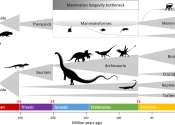The 'longevity bottleneck' hypothesis: Research suggests that dinosaurs may have influenced how human beings age
Human aging may have been influenced by millions of years of dinosaur domination according to a new theory from a leading aging expert. The 'longevity bottleneck' hypothesis has been proposed by Professor Joao Pedro de Magalhaes ...





